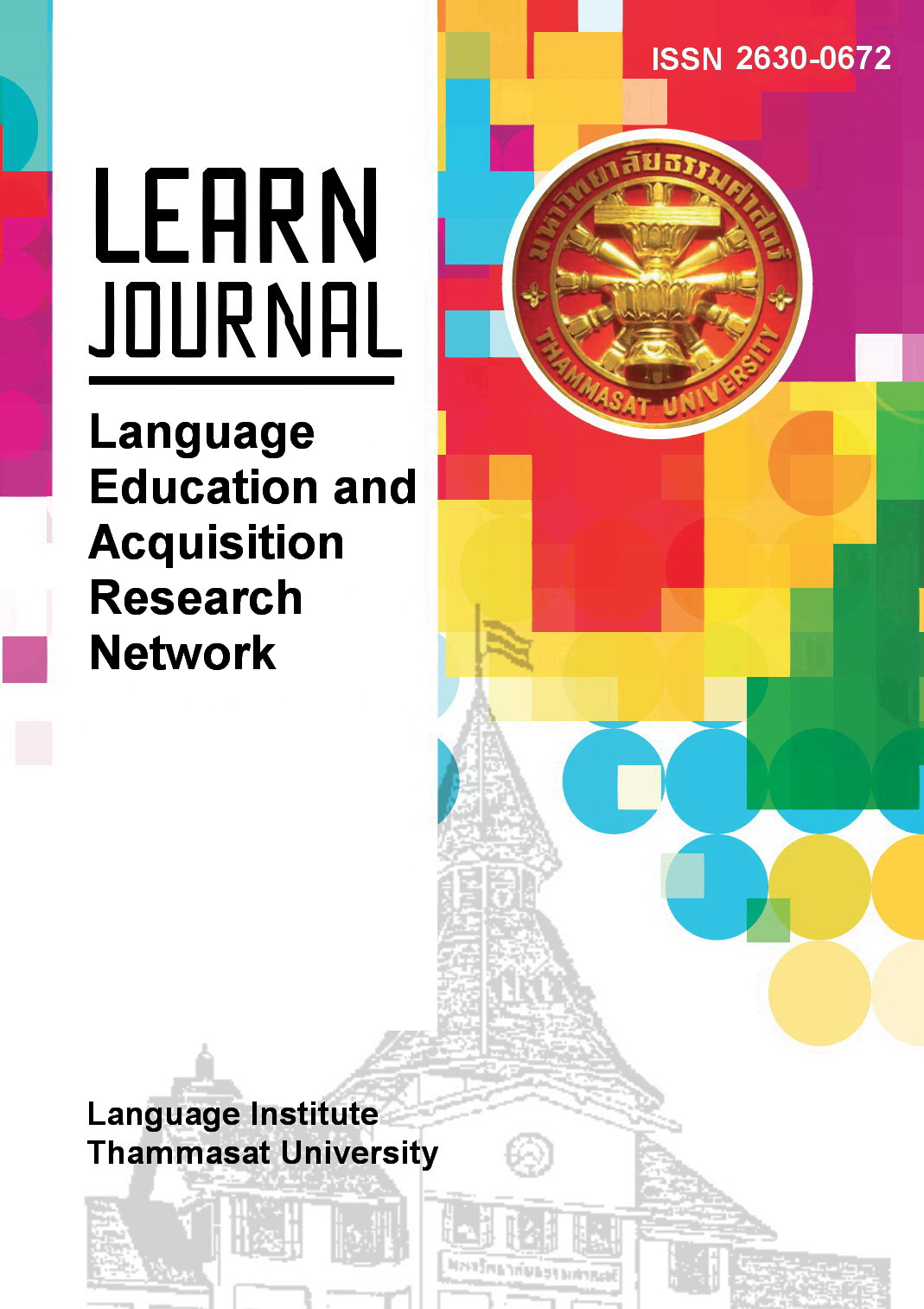Students’ Lived Experiences in English Program in a Thai Primary School: A Phenomenological Study
Main Article Content
Abstract
The purpose of this study was to explore the lived experiences of Thai primary school students who have studied in an English Program (EP) in a university demonstration school in Thailand. EP is regarded as one of Thailand’s educational reform goals that will enhance Thai students’ English competency through using English as a tool of instruction for teaching and learning in two core subjects, Science and Maths. The program started in primary level and continued to secondary level. A phenomenological methodology was employed to explore the students’ lived experiences (n = 10). Semi-structured interviews, classroom observations and document analysis were used for data collection. The data was analyzed using Moustakas (1994)’s phenomenological analysis steps. The findings revealed the essence of the phenomenon. That is, studying in English Program (EP) entailed nine themes under four dimensions as follows: Academic Dimension; Social Dimension; Emotional Dimension, and Personal Dimension. Some implications are discussed concerning the appropriate EP program policy and the inclusion of the voices of teachers and school administrators. Some limitations are also mentioned.
Article Details
References
Arunrat, P. (2013). Parents’ satisfaction of education management of the
English Program of public schools under office of the basic education commission in central area. Business Administration Journal, 3(2), 161-171.
Brown, R., & Heck, D. (2018). The construction of teacher identity in an
alternative education context. Teaching and Teacher Education, 76, 50-57.
Chandang, M. (2015). A study of foreign teachers management of private bilingual
schools in Bangkok Metropolis. [Unpublished master thesis]. Chulalongkorn University, Thailand.
Chinasetawong, K. (2010). Expectations of parents toward an English Program in
basic education service area 3 Bangkok. [Unpublished master thesis]. Rangsit University,
Chotchaipong, M., Charoenkul, N., & Siribanpitak, P. (2020). Best Practices in Promoting Bilingual Proficiency for Early Childhood Students in Thailand: Case Studies of Satit Bangna School and Plearnpattana School. Dhonburi Rajabhat University Journal, 14(1), 204-215
Creswell, J. W. (2013). Qualitative inquiry and research design: choosing among five
approaches (3rd ed.): Sage Publications.
Fields, D. (2002). " Transition 101": From elementary to middle school. The Education Digest, 67(7), 38-41.
García, O. (2011). Bilingual education in the 21st century: A global perspective: John Wiley & Sons.
Jansong, S. (2004). The Organization of English Program Curricula in primary
bilingual schools under the jurisdiction of the office of the basic education commission. [Unpublished master thesis]. Chulalongkorn University,
Karuwan, S. (2007). An Analysis of problems and solutions of Bilingual Schools in
Bangkok Metropolis. [Unpublished master thesis]. Chulalongkorn University, Thailand.
Kent, H., & Fisher, D. (1997). Associations between teacher personality
and classroom environment. The Journal of Classroom Interaction, 33, 5-13.
Kohut, S. (2000). The American middle school: A bridge between
elementary and senior high schools. Retrieved from http://www.nmsa.org
Medgyes, P. (1994). The non-native teacher: Macmillan.
Moustakas, C. (1994). Phenomenological research methods. Sage publications.
Newmann, F. (1998). Academic success in secondary schools. In K.
Borman & B. Schneider (Eds.), The Adolescent Years: Social Influences and Educational Challenges. The National Society for the Study of Education.
Norton, B., & Tang, C. (1997). The identity of the nonnative ESL teacher
on the power and status of nonnative ESL teachers. Tesol Quarterly, 31(3), 577-580.
Pan, Q. (2015). Models of dual language classroom instruction: a case of Sarasas
affiliated schools. [Unpublished master thesis] Chulalongkorn University, Thailand.
Patton, M. Q. (2002). Qualitative research and evaluation methods (3rd ed.).
Sage publications.
Patton, M. Q. (2015). Qualitative research and evaluation methods.
Integrating theory and practice. Sage.
Ramos, F. (2001). Teachers' opinions about the theoretical and practical
aspects of the use of native language minority students: A cross-sectional study. Bilingual Research Journal, 25(3), 357-374.
Rasamimariya, K. (2001). The Development of an administrative system for the
English Program of schools in Bangkok Metropolis. [Unpublished PhD thesis]. Chulalongkorn University, Thailand.
Ruengwatcharasak, S., Srikaew, J., Kaisongkram, R., Kamonsin, S.,
Karakage, D., & Jantarangkoon, P. (2010). Parents' expectations on bilingual education at Tessaban Pattana School. Journal of Yala Rajabhat University, 3(1), 52-58.
Saldaña, J. (2013). The coding manual for qualitative researchers.
Sage.
Tonelson, S. W. (1981). The importance of teacher self concept to create
a healthy psychological environment for learning. Education, 102(1), 96-100.
van Manen, M. (2016). Researching lived experience: Human science for an action sensitive pedagogy: Routledge.
Vygotsky, L. S., & Cole, M. (1978). Mind in society: Development of higher
psychological processes: Harvard University Press.
Wasicsko, M. M. (2007). The perceptual approach to teacher dispositions.
Dispositions in teacher education, 53.
Wei, Y. Y., & Mhunpiew, N. (2020). School choices in Thailand basic
education: International parents’ perspectives. APHEIT International Journal, 9(2), 80-95.


